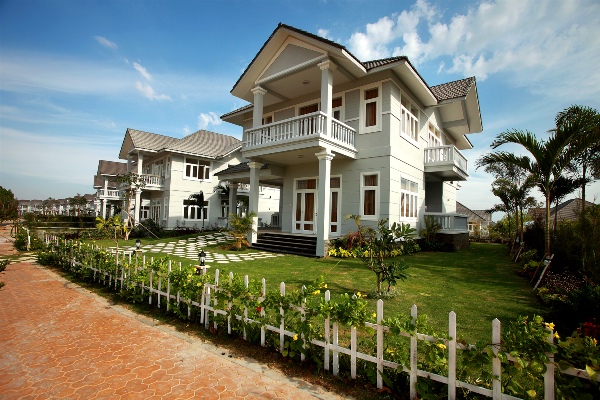Latest regulations on classification of villas in Vietnam
What are the latest regulations on classification of villas in Vietnam? What are the regulations on principles of management, use, maintenance, and renovation of villas in Vietnam? - Minh Tuyet (Tien Giang)

Latest regulations on classification of villas in Vietnam (Internet image)
Regarding this issue, LawNet would like to answer as follows:
1. Latest regulations on classification of villas in Vietnam
According to Clause 1, Article 34 of Decree 99/2015/ND-CP, villas are divided into 3 groups:
(1) Group 1 villas are those ranked as historical, cultural sites according to regulations of law on cultural heritage; villas having architectural values, and ancient houses determined by a Council specified in Clause 2 Article 79 of the Law on Housing and approved by the People’s Committee of the province;
(2) Group 2 villas are villas other than those specified in Point a of this Clause that have architectural, historical, cultural values determined by a Council specified in Clause 2 Article 79 of the Law on Housing and approved by the People’s Committee of the province;
(3) Group 3 villas are villas other than those specified in (1) and (2).
2. Principles of management, use, maintenance, and renovation of villas in Vietnam
According to Clause 2, Article 34 of Decree 99/2015/ND-CP, the management, use, maintenance, and renovation of villas must:
- Comply with provisions of the Law on Housing; for state-owned villas, comply with regulations on management and use of state-owned houses; for houses having artistic, historical, cultural values, comply with regulations of law on management of cultural heritage;
- For group 1 villas, maintain the outer architecture and inner structures, construction density, number of stories, and height;
- For group 2 villas, maintain the outer architecture;
- For group 3 villas, comply with regulations of law on planning, architecture, and construction.
3. Regulations on renovation of old house in Vietnam
According to Clause 4, Article 87 of the Law on Housing 2014, the renovation of old house must comply with the regulations below:
- Do not change the status quo of the villas;
- Do not demolish the house if it is not seriously damaged, in danger of collapse according to appraisal given by the housing authority of province; if the house is reconstructed as required, it must conform to the same architecture, materials, building density, number of storeys and the height of the old villa;
- Do not create structure in order to increase area or expand or appropriate outside space of the villa.
4. Prohibited acts regarding housing in Vietnam
Prohibited acts regarding housing in Vietnam according to Article 6 of the Law on Housing 2014 are as follows:
- Infringing the homeownership of the State, organizations, households or individuals.
- Obstructing the fulfillment of state management of housing, exercise of rights and fulfillment of obligations of the organization, household, or individual in terms of the homeownership, use of housing and housing-related transactions.
- Introducing policies on residential construction projects or residential construction projects in contravention of approved residential construction planning, residential development planning.
- Building houses on the pieces of land other than residential land; build houses in contravention of standards for design standards, housing area standards applied to each type of houses as prescribed. Applying the incorrect calculation of floor area prescribed in law on housing sale or specified in the lease purchase agreement.
- Illegal appropriation of housing areas; encroaching upon the space and facilities under common areas or ownership of other owners in any shape or form; arbitrarily change the bearing structure or change the design of private areas in the apartment building.
- Using the common areas and facilities under joint ownership or joint use for private purposes; use common areas or the areas for service provision in a mixed-use building for improper purposes against the approval of residential construction project or the approved project, unless such area is permitted to change purposes by a competent agency.
- Using mobilized capital or advance payments for housing development for improper purposes.
- The investor in a residential construction project authorizing or assigning the parties involved in investment cooperation, joint venture, association, capital contribution or other organizations, individuals to conclude agreements on housing lease, lease purchase, sale, deposit agreements on housing-related transactions or agreement on trading of land use rights in projects.
- Making transactions in housing sale or transfer of housing sale agreement, housing lease, lease purchase, gifting, exchange, inheritance, mortgage, capital contribution, lending, and permission for stay or authorization for housing management not in accordance with this Law.
- Renovating, expanding, demolishing the houses under agreements on housing lease, lease purchase, lending, permission for stay, or authorization of housing management without the consent of the homeowner.
- Using the apartments not for residential purposes; using the area for business purposes in the apartment building under approved project for trading flammable materials, explosives, providing services causing environmental pollution, noise or negative effects on the lives of households and individuals in the apartment building as prescribed in regulations of the Government.
- Using the separate houses for trading flammable materials, explosives, providing services causing environmental pollution, noise or other operations or negative effects on the lives of households and individuals in the apartment building as prescribed in regulations of law on requirements for business.
- Providing information about housing inaccurately, untruthfully, unconformably with regulations or requests of the competent agencies; destroy or falsify information in the database of housing managed by the competent agencies.
- Key word:
- villas
- in Vietnam
- Cases of land rent exemption and reduction under the latest regulations in Vietnam
- Economic infrastructure and social infrastructure system in Thu Duc City, Ho Chi Minh City
- Regulations on ordination with foreign elements in religious organizations in Vietnam
- Increase land compensation prices in Vietnam from January 1, 2026
- Determination of land compensation levels for damage during land requisition process in Vietnam
- Who is permitted to purchase social housing according to latest regulations in Vietnam?
-

- Emergency response and search and rescue organizations ...
- 10:29, 11/09/2024
-

- Handling of the acceptance results of ministerial ...
- 09:30, 11/09/2024
-

- Guidance on unexploded ordnance investigation ...
- 18:30, 09/09/2024
-

- Sources of the National database on construction ...
- 16:37, 09/09/2024
-

- General regulations on the implementation of administrative ...
- 11:30, 09/09/2024
-

- Notable new policies of Vietnam effective as of ...
- 16:26, 11/04/2025
-
.Medium.png)
- Notable documents of Vietnam in the previous week ...
- 16:21, 11/04/2025
-
.Medium.png)
- Notable documents of Vietnam in the previous week ...
- 16:11, 02/04/2025
-
.Medium.png)
- Notable new policies of Vietnam to be effective ...
- 16:04, 02/04/2025
-
.Medium.png)
- Notable new policies of Vietnam effective from ...
- 14:51, 21/03/2025

 Article table of contents
Article table of contents
